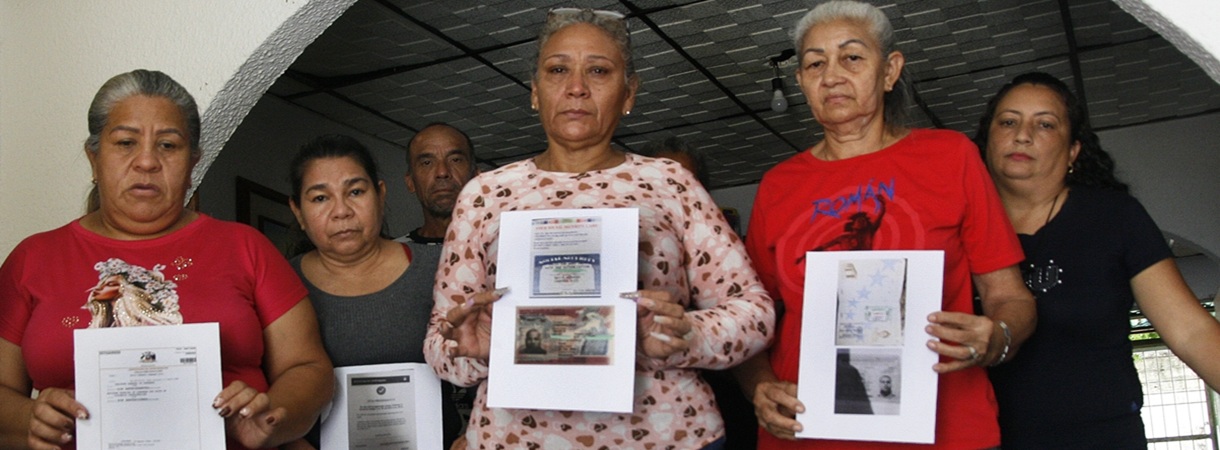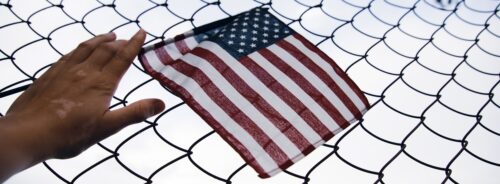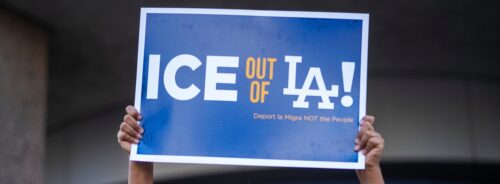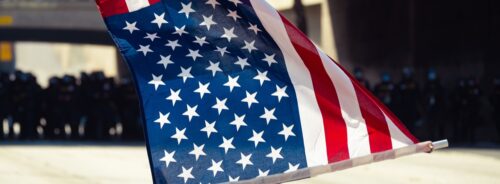Starting four months ago, the Trump administration carried out one of the worst abuses of government power in generations, imprisoning roughly 250 Venezuelan men (and dozens of Salvadorans) without due process in El Salvador’s notorious Terrorism Confinement Center (CECOT). The operation came less than 24 hours after President Trump secretly invoked the wartime Alien Enemies Act of 1798 against the Venezuelan prison gang “Tren de Aragua,” and was carried out in defiance of federal court orders blocking four of the five flights moving the men to CECOT. For four months, the men were held incommunicado in CECOT without any access to the outside world.
Now, thanks to a prisoner exchange carried out on July 18, the men have been flown from El Salvador to Venezuela in exchange for Venezuela releasing 10 U.S. citizens and lawful permanent residents held as political prisoners. In a dramatic video, the men were met by family and loved ones flown to meet the men by Venezuelan President Nicolás Maduro, tasting freedom for the first time in months.
However, their ongoing fate remains unclear. While the freeing of hundreds of wrongfully imprisoned men will provide them temporary relief, many of the men had previously fled Venezuela seeking asylum in the United States and were sent to El Salvador before their U.S. asylum cases had been decided. Others still have family and friends in the United States and may seek to return following court cases.
How Did We Get Here?
On March 14, President Trump invoked the Alien Enemies Act for the fourth time in American history (and the first ever peacetime invocation of the Act), declaring that Tren de Aragua was an arm of the Venezuelan state and was engaged in an invasion of the United States. That declaration kicked off an operation which had been extensively planned in the previous weeks. Hundreds of Venezuelan men who had been tagged in the Department of Homeland Security’s databases as being linked to Tren de Aragua were shuttled to a South Texas detention center and told they would be deported — but not to where.
Most if not all of these men had no real connections to Tren de Aragua at all but had been falsely identified as such by low-level DHS officers. For example, Andry Hernandez Romero, a gay makeup artist who fled Venezuela to seek asylum in the United States, was falsely labeled a member of Tren de Aragua based on two tattoos, one saying “Mom” on his right wrist and the other saying “Dad” on his left wrist. Because each word had a little crown above it, and DHS intelligence reports had stated that some Tren de Aragua members have tattoos with crowns, U.S. Customs and Border Protection officers declared him a gang member when he arrived at a port of entry to seek asylum. No other evidence linked him to the gang, and his family has stated that the crowns were in honor of his hometown’s “Three Kings Day” festival and pageant, which he had participated in as a youth and an adult.
Other men were labeled gang members based on even flimsier evidence, or even outright errors. Neri Alvarado, an asylum seeker living in Houston, was questioned by ICE over a rainbow tattoo of an autism awareness ribbon. After officials interrogated him and looked at his phone, he was initially told that there was no evidence he was linked to a gang. But for unknown reasons, he was detained anyway. In yet another case, Frengel Reyes Mota appears to have been falsely labeled a gang member because his file had been incorrectly combined with another person’s file, and gang allegations against a different person were included in his paperwork.
DHS has since argued that each man sent to Venezuela had been “verified” as a gang member. But evidence shows that DHS used a “validation guide” which permitted people to be “validated” as gang members based solely on tattoos, clothing, or even being seen in a photograph with someone else DHS believed to be a gang member.
Making matters worse, experts on Tren de Aragua state that the gang doesn’t even use tattoos; meaning the entire premise of many of the “validations” carried out by DHS was faulty. As a result, many of those imprisoned in El Salvador were entirely innocent of any connection to gangs or criminality.
Most importantly, none of the men brought to the detention center in Texas were permitted any opportunity to challenge their designation as a gang member — they were simply hustled onto planes on March 15 and sent to El Salvador before they knew what was happening. In many cases, officials outright lied to the men before the planes took off, saying that they would be deported to Venezuela.
While the planes were in mid-air, a federal judge ordered the Trump administration to turn the planes around. It refused. This defiance has since become the subject of a criminal contempt proceeding which is currently on pause at the D.C. Circuit Court of Appeals. But in the months since then, the Supreme Court has made definitively clear that the men were denied due process. As of today, the Trump administration has been ordered by multiple federal judges either not to conduct any Alien Enemies Act removals, or to ensure that any person targeted by the law has multiple weeks in which to hire a lawyer and bring a lawsuit challenging the determination.
What Happened on Friday with the Prisoner Exchange?
In the four months that the men were imprisoned in CECOT, the Trump administration repeatedly insisted that they were not under U.S. custody. Rather, they claimed that El Salvador maintained sole custody over the men and the United States had no control over their fate. This claim was undermined extensively by statements from the government of El Salvador.
For example, El Salvador’s Ministry of Foreign Affairs stated soon after the men were first sent there that they would be held for one year while the United States determined what to do with them. El Salvador’s Vice President also indicated that the United States was paying to have El Salvador jail the men, and that El Salvador had no further role in their fate (the United States later acknowledged this in court and released documentation showing it had agreed to provide “in-kind and financial support” to El Salvador in exchange for the detentions). Most compellingly, in response to inquiries from the United Nations investigating the incident under the rubric of “enforced disappearances” in violation of international law, the government of El Salvador formally stated that the men were not being held under Salvadoran law, but that CECOT had effectively been leased out to the United States and the United States was solely responsible for the men’s imprisonment.
Despite these statements, the United States continued to maintain that it could not ask El Salvador to release any of the men, and that it did not control their fate. Nevertheless, for months, the United States sought to use the men as pawns in a prisoner swap with Venezuela. While talks stalled for some time, on Friday, July 18, they came to fruition.
Under the deal between the United States and Venezuela, the United States would have El Salvador send the Venezuelans detained in CECOT to Venezuela, while the Venezuelan government would release five American citizens and five people with American green cards who were being detained in Venezuelan prisons. In addition, Venezuela agreed to release some domestic political prisoners to house arrest, although details of who and how many remain unclear.
In court, the United States is still claiming that they were not responsible for the men being released, saying that it was a decision purely up to Salvadoran president Nayib Bukele. But in a press release issued the same day, the State Department took credit, saying that the deal happened “thanks to President Trump’s leadership.”
What Happens Next?
Now that the men have been returned to Venezuela, they are being screened by the Venezuelan government and then will be released to reconnect with family. Stories of abuse in CECOT have already emerged, with one man, musician Arturo Suárez, saying he was beaten daily. The Venezuelan government has said it will set up a commission to investigate abuses against the men as well.
Crucially, the United States has acknowledged that some of the men may wish to return to the United States to get the due process they were previously denied; or to seek asylum in proceedings that were halted after their imprisonment. In a statement to a federal judge, the Trump administration acknowledged that they would “facilitate” the return of any of the men pursuant to court order.
The men who were imprisoned in CECOT had cases in a variety of procedural postures. Some had already lost their cases and, like the Council’s client Edicson Quintero Chacón, were actively hoping to be deported back to Venezuela, while others had pending cases and strong asylum claims that had yet to be heard. Some have no ties to the United States, while others have family and loved ones there, with at least one person married to a U.S. citizen.
As a result, what happens next is likely to be complicated by those individual factors. Some individuals will file lawsuits or seek to use existing lawsuits as a way to return to the United States and pick up the pieces of the lives that were suddenly disrupted. Others may have no desire or pathway to return to the United States, yet may still seek to pursue litigation to hold the Trump administration accountable for what they did. Still others may fear reprisals from the Maduro government and will seek to leave Venezuela to pursue asylum in a third country.
While the ultimate outcome of these cases is unknown, at least the men are free for now. As their stories of what happened in El Salvador become public, pressure will hopefully build for international accountability. But unfortunately, the United States has indicated a desire to carry out flights similar to those that happened on March 15, and has even floated the possibility of sending U.S. citizens to CECOT. Ultimately, the Supreme Court will have to decide whether Trump overstepped his powers, and what kind of compensation or relief will be available to those whose rights were violated in such a heinous manner.
 The American Immigration Council is a non-profit, non-partisan organization.
The American Immigration Council is a non-profit, non-partisan organization. 


